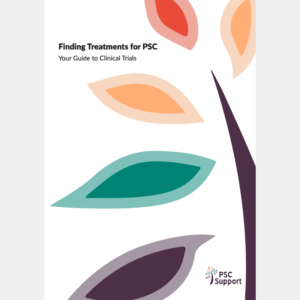SABR-PSC
Single Arm study of BRodalumab in Primary Sclerosing Cholangitis
Thinking of taking part?
- Check how suitable you are by looking at the information below.
- Check our map to see if you can get to a study site.
- Contact the research team for more details if you think you are suitable. Check back regularly as we are adding more contact info every day.
- Got a question? Our Clinical Trials Pack has lots of information about how to join clinical trials, switching hospitals for trials and what's involved.
- Contact us if you need any help.
Quick Links
About Brodalumab
Brodalumab is a medicine that works by specifically targeting chemical messengers called ‘Interleukin 17’ (IL-17) in the body. IL-17 is one of the main causes of inflammation and damage in skin and joint conditions such as psoriasis.
Brodalumab is currently being safely and successfully used in patients with psoriasis.
Research suggests that IL-17 may play a crucial role in the inflammation and scarring (fibrosis) of the bile ducts that is seen in PSC. Therefore, by blocking this chemical messenger with Brodalumab, it may limit inflammation and liver damage.
The SABR-PSC study, funded by the NIHR, will investigate Brodalumab’s use in patients with PSC.
FAQs
| Trial Name | The SABR-PSC Study |
| ISRCTN Registry Number | ISRCTN15271834 |
| Intervention | An injection under the skin (subcutaneous injection). Participants will be taught by a trained professional how to self-inject at their first study visit. |
| Recruiting now? | Estimated to start December 2023/ January 2024 |
| Participating Centres | Also see PSC Support map,
|
| Contact | SABR.PSC@uea.ac.uk |
| Liver disease diagnosis | Large duct primary sclerosing cholangitis |
| Age | You must be an adult (18 years and above) |
| Females: can I be pregnant or breastfeeding? | No.
You must be on a reliable form on contraception during the study period. Participants cannot take part if they are breast feeding. |
| Is inflammatory bowel disease (IBD) allowed? (updated 01 May 2024) | Participants with AND without inflammatory bowel disease are eligible. For those with IBD there are specific PSC with IBD eligibility criteria, including that your IBD must be inactive or mild and in remission. No flares allowed within the 3 months prior to trial start (screening visit). |
| Is there an ALP (alkaline phosphatase) requirement? | No |
| Can I take UDCA (Urso)? | Yes- provided participants are on a stable dose and there are no modifications to the dose during the trial or in the 12 weeks prior to trial entry. |
| Can I take biologics | No |
| Can I take part if I have a stent? | Yes- provided a stent has not been inserted or changed within the 6 months prior to the start of the trial (screening visit).
Participants will not be eligible if a dominant stricture is thought to need further stent insertion or dilation during the 6 months of the trial. |
| Are recent acute cholangitis (ie bacterial cholangitis) attacks allowed? | Participants are not eligible if there is evidence of cholangitis within 3 months prior to the trial start (screening visit), or if antibiotics or a hospital admission was required for cholangitis within the last 3 months.
Participants taking prophylactic antibiotics for cholangitis or any other infection are also not eligible. Please ask the study team for more information on this. |
| Can I take part if I have had a liver transplant? | No |
| Is cirrhosis allowed? | No |
| Previous studies and information | This is the first study to our knowledge of this drug in patients with liver disease.
It is currently licensed for use in psoriasis, in which it is found to be safe and effective. Brodalumab in psoriasis review article New Study to Investigate Brodalumab in the Treatment of PSC (PSC Support news) |
| Are travel expenses covered? | Yes - reasonable travel expenses will be reimbursed. |
| Procedures and tests include: |
|
| How many study visits will there be? How long will each study visit be? | There are 7 study visits in total - 6 face-to-face and 1 remote consultation at the end of the trial period.
Study visits will take approximately 1 hour to complete, with the penultimate (the visit before the final one) study visit lasting approximately 2 hours. |
| Duration of study | Study participation lasts a total of 6 months |
| Basic design of study | Single arm, open label study. All participants will receive the active drug - Brodalumab. There is no placebo arm in this trial. |
| How is this drug thought to work? | Research points towards the immune system being responsible for the bile duct damage that is seen in PSC. The parts of the immune system that drive this damage are called B and T cells. A unique type of T cell (T helper 17) releases a chemical called Interleukin 17. In PSC, there appears to be an increase in T helper 17 cells and Interleukin 17.
In mice, reducing Interleukin 17 activity has been shown to reduce liver inflammation and fibrosis (scarring). Brodalumab is a drug that is able to block the activity of Interleukin 17 and thereby potentially limiting damage to the liver. |
| Link to Sponsor | Norfolk and Norwich University Hospital, NHS Foundation Trust |

